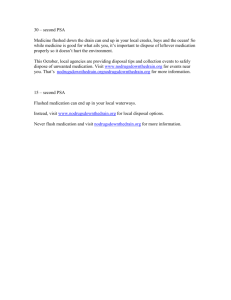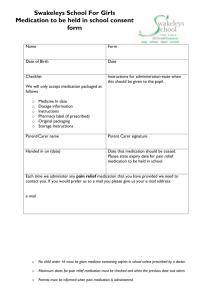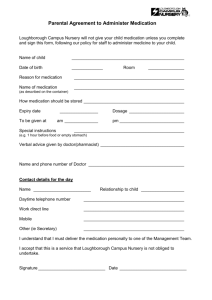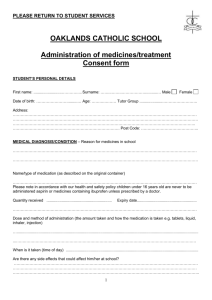20827 Support a person to use prescribed medication in a health or
advertisement
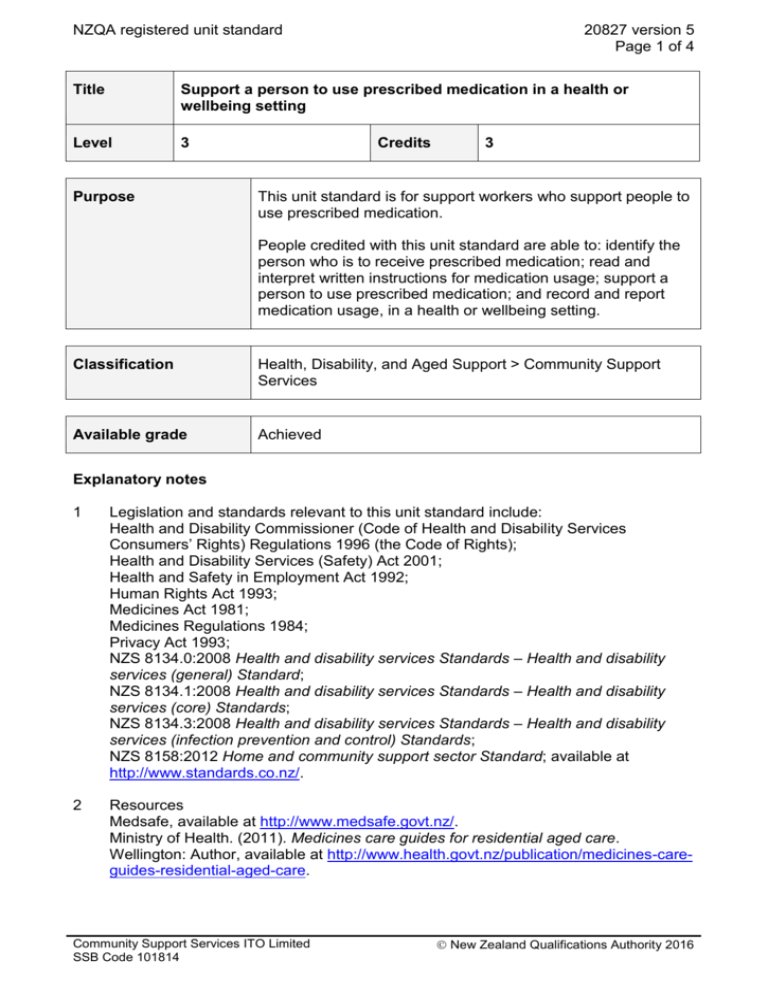
NZQA registered unit standard 20827 version 5 Page 1 of 4 Title Support a person to use prescribed medication in a health or wellbeing setting Level 3 Purpose Credits 3 This unit standard is for support workers who support people to use prescribed medication. People credited with this unit standard are able to: identify the person who is to receive prescribed medication; read and interpret written instructions for medication usage; support a person to use prescribed medication; and record and report medication usage, in a health or wellbeing setting. Classification Health, Disability, and Aged Support > Community Support Services Available grade Achieved Explanatory notes 1 Legislation and standards relevant to this unit standard include: Health and Disability Commissioner (Code of Health and Disability Services Consumers’ Rights) Regulations 1996 (the Code of Rights); Health and Disability Services (Safety) Act 2001; Health and Safety in Employment Act 1992; Human Rights Act 1993; Medicines Act 1981; Medicines Regulations 1984; Privacy Act 1993; NZS 8134.0:2008 Health and disability services Standards – Health and disability services (general) Standard; NZS 8134.1:2008 Health and disability services Standards – Health and disability services (core) Standards; NZS 8134.3:2008 Health and disability services Standards – Health and disability services (infection prevention and control) Standards; NZS 8158:2012 Home and community support sector Standard; available at http://www.standards.co.nz/. 2 Resources Medsafe, available at http://www.medsafe.govt.nz/. Ministry of Health. (2011). Medicines care guides for residential aged care. Wellington: Author, available at http://www.health.govt.nz/publication/medicines-careguides-residential-aged-care. Community Support Services ITO Limited SSB Code 101814 New Zealand Qualifications Authority 2016 NZQA registered unit standard 20827 version 5 Page 2 of 4 3 In the context of this unit standard, support should aim to maintain, improve, or restore a person’s independence and/or interdependence by utilising the person’s existing strengths and appropriate resources; but may include providing assistance to enable a person’s health and wellbeing needs to be met. 4 Evidence may be gathered through actual performance in the candidate's workplace, and/or through the use of simulated situations that closely mirror the requirements of actual workplace performance in a health or disability context. 5 Definitions Different types of medication means – creams, inhalers, ointments, oral, topical. Topical may include but is not limited to eye/ear/nose drops/sprays, transdermal patches. Health or wellbeing setting includes but is not limited to – the aged care, acute care, community support, disability, mental health, and social services sectors. Organisational policies and procedures – policies, procedures and methodologies of an organisation. They include legislative and regulatory requirements which may apply across a company, a specific site, or a workplace. Requirements are documented in the company’s health and safety plans, contract work programmes, quality assurance programmes, policies and procedural documents. Person – a person accessing services. Other terms used for the person may include client, consumer, customer, patient, individual, resident, service user, tūroro or tangata whai ora. Prescribed medication – medication that is prescribed by registered health care professionals in accordance with the requirements of the Medicines Act 1981 and Medicines Regulations 1984. Personal plan – is a generic term that covers the individual or group plans (which may also be referred to by other names) that are developed with people receiving support (and may include their family/whānau as appropriate). 6 Support workers who require information to prepare them to support people to use pre-packaged medication should be assessed against Unit 23685, Describe prepackaged medication and the process for its use in a health or disability context. Outcomes and evidence requirements Outcome 1 Identify the person who is to receive prescribed medication in a health or wellbeing setting. Evidence requirements 1.1 Checks are made to ensure that the person is the intended recipient. Range checks include but are not limited to – checking the name on the prescribed medication, and may include but are not limited to – photograph, id bracelet, name tag or badge, asking the person or the person’s family/whānau. Community Support Services ITO Limited SSB Code 101814 New Zealand Qualifications Authority 2016 NZQA registered unit standard 20827 version 5 Page 3 of 4 Outcome 2 Read and interpret written instructions for medication usage in a health or wellbeing setting. Range evidence is required for reading and interpreting written instructions for three different types of medication. Evidence requirements 2.1 Written instructions for medication usage are read and interpreted in accordance with the person's personal plan and organisational policies and procedures. Outcome 3 Support a person to use prescribed medication in a health or wellbeing setting. Range evidence is required for supporting a person to use the types of medication for which evidence was gathered for outcome 2. Evidence requirements 3.1 The expiration date of medication is checked and cautionary labelling noted whenever provided by the prescriber/dispenser. 3.2 The person is supported to use the medication in accordance with the person's personal plan and organisational policies and procedures. 3.3 Any remaining medication is returned to storage after use and stored in accordance with the person's personal plan and organisational policies and procedures. Outcome 4 Record and report medication usage in a health or wellbeing setting. Range evidence is required for recording and reporting medication usage using the types of medication for which evidence was gathered for outcomes 2 and 3. Evidence requirements 4.1 Any errors and/or wastage are recorded and reported in accordance with organisational policies and procedures. Range errors and wastage may include but are not limited to – a person reports taking the medication but the support worker did not observe this, wrong medication was taken, incorrect dose of medication was taken, medication was taken at the wrong time, discrepancy in amount of remaining medication, medication was lost (dropped, vomited up, spat out, or discarded). Community Support Services ITO Limited SSB Code 101814 New Zealand Qualifications Authority 2016 NZQA registered unit standard 4.2 20827 version 5 Page 4 of 4 Medication usage is recorded and reported in accordance with the personal plan and organisational policies and procedures. Planned review date 31 December 2019 Status information and last date for assessment for superseded versions Process Version Date Last Date for Assessment Registration 1 21 October 2004 31 December 2017 Review 2 25 June 2007 31 December 2017 Revision 3 21 January 2011 31 December 2017 Review 4 14 December 2012 31 December 2017 Review 5 16 April 2015 N/A Consent and Moderation Requirements (CMR) reference 0024 This CMR can be accessed at http://www.nzqa.govt.nz/framework/search/index.do. Please note Providers must be granted consent to assess against standards (accredited) by NZQA, before they can report credits from assessment against unit standards or deliver courses of study leading to that assessment. Industry Training Organisations must be granted consent to assess against standards by NZQA before they can register credits from assessment against unit standards. Providers and Industry Training Organisations, which have been granted consent and which are assessing against unit standards must engage with the moderation system that applies to those standards. Requirements for consent to assess and an outline of the moderation system that applies to this standard are outlined in the Consent and Moderation Requirements (CMR). The CMR also includes useful information about special requirements for organisations wishing to develop education and training programmes, such as minimum qualifications for tutors and assessors, and special resource requirements. Comments on this unit standard Please contact the Community Support Services ITO Limited enquiries@careerforce.org.nz if you wish to suggest changes to the content of this unit standard. Community Support Services ITO Limited SSB Code 101814 New Zealand Qualifications Authority 2016


